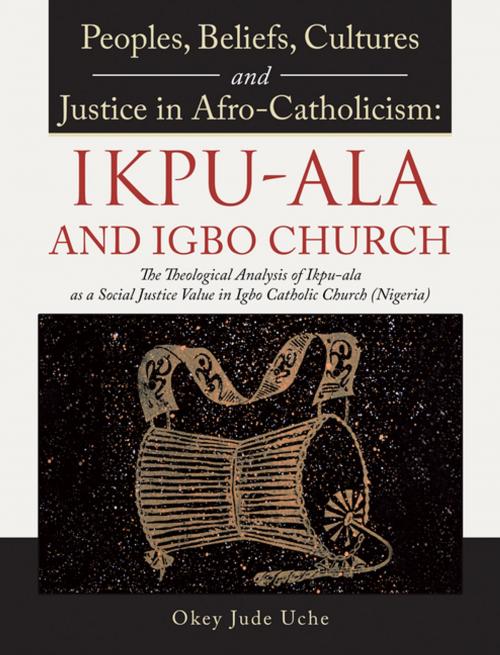Peoples, Beliefs, Cultures, and Justice in Afro-Catholicism: Ikpu-Ala and Igbo Church
The Theological Analysis of Ikpu-Ala as a Social Justice Value in Igbo Catholic Church (Nigeria)
Nonfiction, Religion & Spirituality, Theology, Reference & Language, Education & Teaching| Author: | Okey Jude Uche | ISBN: | 9781546209218 |
| Publisher: | AuthorHouse | Publication: | November 10, 2017 |
| Imprint: | AuthorHouse | Language: | English |
| Author: | Okey Jude Uche |
| ISBN: | 9781546209218 |
| Publisher: | AuthorHouse |
| Publication: | November 10, 2017 |
| Imprint: | AuthorHouse |
| Language: | English |
This book explores in depth Ikpu-ala as a social justice value in the Igbo social justice system. The traditional social justice concept of ikpu-ala provides an important conceptual framework through which adult Igbo Christians can engage in a critical and conscious theological reflections upon how they can make the Igbo Christian community fully authentic and faithful to the Gospel of Jesus Christ. This is a process that will highlight the total transformation of the Igbo society, which began with the arrival of the missionaries in 1885. This reflection is based on the Igbo experience and understanding of Omenala, the Igbo moral code, in which the world of the material and the spiritual, while occupying distinct domains, nonetheless remain deeply intertwined. In this book, the author explores that for the Igbo community, the reality of theology has evolved as a distinct from of experience that is deeply connected with tradition for the sake of praxis (Don Browning, 1995). Consequently, the author not only sees Ikpu-ala as authentic Igbo social justice value but also considers it as something that can be integrated into the Christian social values without either destroying Igbos longstanding cultures or traditions. The author highlights two key lessons from the Igbo integration of ikpu-ala into Christian social justice: (1) that the Igbo Catholic Church should engage the Igbo culture and traditions in a theological interactive reflections for the incarnation of the Word among the Igbo Catholics, and (2) that Ikpu-ala, with its theological values, can assist the Igbo Catholic Church in the sacrament of reconciliation and so transform the twenty- first century Igbo Catholic into an integrated and authentic Christian.
This book explores in depth Ikpu-ala as a social justice value in the Igbo social justice system. The traditional social justice concept of ikpu-ala provides an important conceptual framework through which adult Igbo Christians can engage in a critical and conscious theological reflections upon how they can make the Igbo Christian community fully authentic and faithful to the Gospel of Jesus Christ. This is a process that will highlight the total transformation of the Igbo society, which began with the arrival of the missionaries in 1885. This reflection is based on the Igbo experience and understanding of Omenala, the Igbo moral code, in which the world of the material and the spiritual, while occupying distinct domains, nonetheless remain deeply intertwined. In this book, the author explores that for the Igbo community, the reality of theology has evolved as a distinct from of experience that is deeply connected with tradition for the sake of praxis (Don Browning, 1995). Consequently, the author not only sees Ikpu-ala as authentic Igbo social justice value but also considers it as something that can be integrated into the Christian social values without either destroying Igbos longstanding cultures or traditions. The author highlights two key lessons from the Igbo integration of ikpu-ala into Christian social justice: (1) that the Igbo Catholic Church should engage the Igbo culture and traditions in a theological interactive reflections for the incarnation of the Word among the Igbo Catholics, and (2) that Ikpu-ala, with its theological values, can assist the Igbo Catholic Church in the sacrament of reconciliation and so transform the twenty- first century Igbo Catholic into an integrated and authentic Christian.















